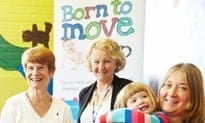Kent Community Health NHS Foundation Trust has launched a mobile app to help parents of newborn babies and young children.
The Born to Move app is available free on Apple and Android devices and offers evidence-based, practical parenting advice, including a series of games and quizzes, to support brain development and physical activity.
The idea for the app was conceived by Julia Haynes, a health visitor at Kent Community Health, who told Digital Health News she wanted to “keep up with the times” and develop an interactive tool to replace booklets, now that most young parents use phones for communication and information.
The app was built by Kent and Medway Health Informatics Service, an NHS shared service focused on developing IT solutions for NHS organisations.
Haynes said she got in touch with the service after receiving an email from them asking frontline healthcare professionals to submit any ideas they had that made use of innovative technologies.
Haynes was selected to pitch her idea at an event at Apple’s UK headquarters and the project was picked for development by Kent and Medway Health Informatics Service the next day.
The design of the app was influenced by a pilot involving a group of 100 parents in Ashford, Swale, Dover and Canterbury, where Haynes learned that “parents don’t want to be told what to do”.
Instead, the team chose to provide limited pieces of information, including interesting details such as the number of cells in a baby’s brain, for parents to then make a choice to go on to the next screen and work out the importance of engaging with their child on both a physical and communicative level.
Haynes said: “We are not just providing things to read. We are prompting parents to move and interact with their children.”
The pilot also helped ensure the app covered more than just newborn babies, with parents requesting support for all stages up to school age.
One mother involved in the pilot praised the “simple, bite-size information” available in the app as an alternative to the “overwhelming” nature of finding useful information on the internet.
Haynes, who has spent 28 years supporting families with young children, said that parents were in need of practical support as “babies don't come with instructions”.
Specific areas the app guides on include the use of ‘tummy time’ to help babies learn to crawl and using games to help children strengthen eye muscles.
Especially important for Haynes is that the app encourages parents to spend less time on devices and more time interacting with their children to help improve vocabulary and other social skills.
She acknowledged the irony of using an app to encourage a reduction in screen time for babies, but said “we can’t ignore the large part that technology plays in our lives; it’s the place we all turn to for information”.
Phil Edbrooke-Childs, managing director of Kent and Medway Health Informatics Service added that mobile apps are set to play a “significant role” in the future of healthcare as most people now turn to their smartphones and tablets when looking for an answer to a problem.
The app is part of Kent Community Health’s wider Born to move – Active Learner project, which is based on a New Zealand programme to promote active play from birth.
Haynes said she was keen for the app to be used more widely beyond Kent, although real progress would be dependent on funding, especially with regards to translating the app into different languages.

